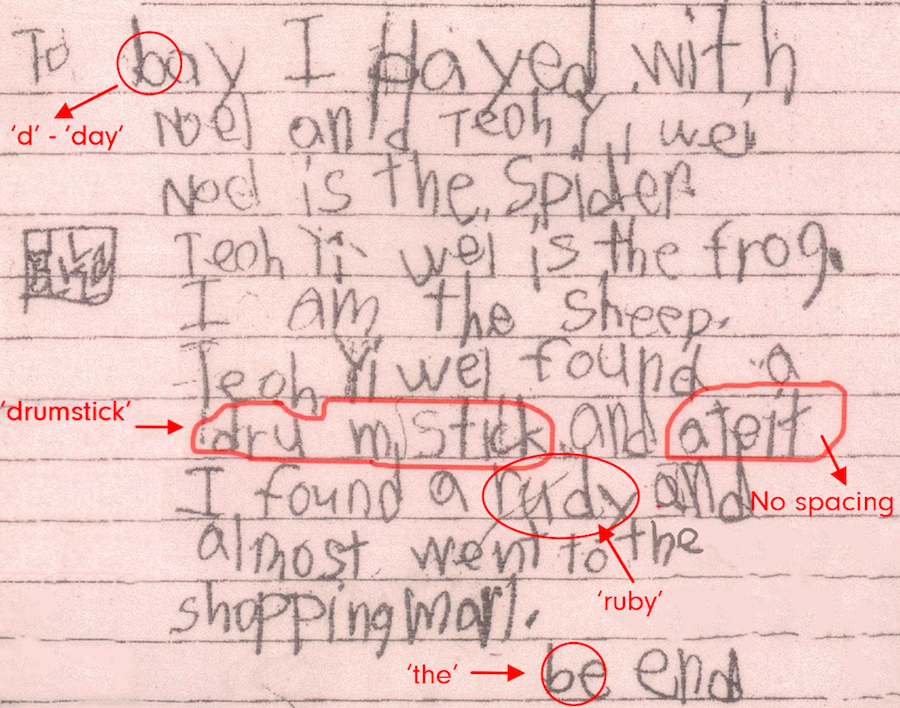What is Dyslexia?
Dyslexia is a language disorder characterized by problems in understanding, recognizing and reading written words.
Students with SLD do not decode automatically they lack fluency in reading (Stichter, Conroy & Kauffman, 2008).
What is Dysgraphia?
Dysgraphia is a brain-based learning disability that affects fine motor skills, particularly writing, through adulthood.
Their writing may be illegible and they are often unwilling to engage in writing activities.
What is Dysorthographia?
Dysorthographia is a learning disability that causes chronic issues with spelling and/or writing.
Symptoms of Dysorthographia include problems with written spelling, grammar, and speed in writing and spelling.
In learning disabilities, the name for mathematical disorder is...
a. Dyspraxia
b. Dyslexiac
c. Dyscalculia
d. Dysphasia
Dyscalculia
The term dysnomia refers to the difficulty of remembering words and may be experienced as part of dysgraphia or dyslexia.
True of False?
True
Auditory Processing Disorder (APD) allows students to process sounds.
True or False?
False
Auditory Processing Disorder causes an individual to not recognize sounds in words (big/beg) even if the sounds are clear and loud enough to be easily heard.
Dyscalculia is a specific learning disorder with impairment in spelling.
True or False?
False
Dyscalculia is a specific learning disorder with impairment in mathematics. It is associated with significant difficulty understanding numbers and working with mathematical concepts.
A child with dyslexia but with no other difficulties would be classified as having:
a. A learning difficulty.
b. Attention deficit/hyperactivity disorder.
c. Autism.
d. A specific learning difficulty.
d. A specific learning difficulty.
Which type of learning disability is being displayed on the monitor? Dyscalculia or Dyslexia 
Dyscalculia
Dyscalculia is a term used to describe specific learning disabilities that affect a child’s ability to understand, learn, and perform math and number-based operations.
Look at the visual on your monitor and tell which type of learning disability is being displayed? Dyslexia or Non Verbal Learning Disorder

Dyslexia
Dyslexia is associated with difficulty with writing, reading and spelling
Look at the visual below on your monitor.

A child with ______ would need this kind of support.
a. semantic memory
b. dyspraxia
c. visuospatial memory
b. dyspraxia
Dyspraxia affects the fine and gross motor skills.
Fill in the blank.
Dyscalculia has three sub-types. These are:
______ difficulty understanding and remembering mathematical fact, __________ difficulty in understanding and remembering procedures, and _____ difficulty in perceiving spatial representation of numerical information and visual information.
a. Semantic memory, Procedural memory and visuospatial memory
b. visual memory, auditory and kinesthic memory
c. Semantic memory, Non-verbal Language Disorder and Dyslexia
The three sub types are: a
Semantic memory - difficulty understanding and remembering mathematical facts.
Procedural memory - difficulty in understanding and remembering procedures,
visuospatial memory - difficulty in perceiving spatial representation of numerical information and visual information.
Fill in the blank
Non-Verbal Language Disorder is characterized by a significant discrepancy between ________ skills and ______ skills.
a. social and emotional
b. verbal and social
c. verbal and reading
b. verbal skills and social skills
Fill in the blank
________ is a specific type in which an individual has difficulty in attaching meaning to sound groups that forms words, sentences and stories.
a. Language Procedure Disorder (LPD)
b. Language Acquisition Disorder (LAD:
c. Language Processing Disorder (LPD)
C. Language Processing Disorder (LPD)
Dyspraxia is associated with sleepiness.
True or False?
False
According to the National Center for Learning Disabilities, individuals with dyspraxia have difficulties in planning and completing fine and gross motor tasks. This can range from simple motor movements, such as waving goodbye, to more complex ones like sequencing steps to brush one’s teeth.
Visual Perceptual/Visual motor deficits affects the understanding of information that a person sees or the ability to draw or copy. It is often seen in persons with...
a. dyslexia, dysgraphia or NVLD
b. NVLD, dyscalculia or APD
c. dysorthographia, visual impaired or APD
a. dyslexia, dysgraphia or NVLD.
Your student has a Special Learning Disability. You noticed she appears clumsy. She hates colouring activities and has difficulty using a scissors for cutting. Which one of the following SLD is she most likely to have?
a. Dyslexia
b. Dyspraxia
c. Dysgraphia
Dyspraxia
Dyspraxia is a condition that affects fine and gross motor skills